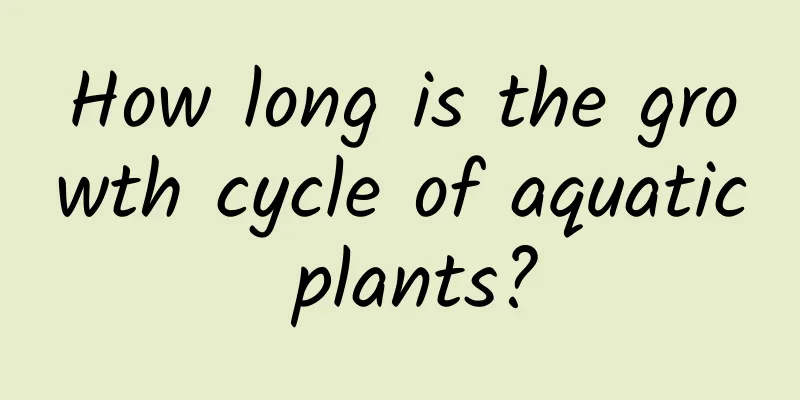How long is the growth cycle of aquatic plants?

Aquatic plant growth cycleThe growth period of aquatic plants is 3-4 months. They can be grown quickly, sprouting in about 3 days and growing out in about ten days. Water plants grow in water. If the container for growing water plants is placed in strong light, these water plants will grow faster. However, fish do not like direct exposure to light, so you should grow water plants such as moss and water plant balls, which can be placed in places with insufficient light and are super easy to grow. Waterweed growth rateWater plants grow very fast. The seeds usually germinate in about a week, and the growth is relatively stable, with a germination rate of about 90%. Usually after 3 days, the surface of the seeds will turn white, and after 5 or 7 days, sprouts will appear on the surface of the water plant seeds. Aquatic plant growth cycle managementTemperature management: Most aquatic plants can grow healthily in water temperatures between 25 and 28 degrees. When the temperature exceeds 30 degrees, the aquatic plants will stop growing. When the temperature is below 20 degrees, the aquatic plants will grow slowly. Fertilization management: Common types of aquatic plant fertilizers include basal fertilizer, root fertilizer, liquid fertilizer, iron fertilizer, etc. Basal fertilizer and root fertilizer are buried in the bottom sand, and liquid fertilizer is directly poured into the water. In the normal breeding process, the rational use of fertilizers is one of the keys to growing aquatic plants well. 1. Fertilize according to the species of aquatic plants: The demand for essential nutrients varies greatly, especially in trace elements. Strictly speaking, each aquatic plant should have its own set of fertilizer formulas, but this is not realistic in life. 2. Fertilize according to the type of aquatic plants: They can be roughly divided into stem aquatic plants, clumping aquatic plants and attached aquatic plants. Among them, the root system of clumping aquatic plants is the most developed, so using basal fertilizer will allow them to absorb nutrients more effectively. 3. Fertilize according to water temperature: The water temperature for the most vigorous growth of ordinary tropical aquatic plants is 24 to 27 degrees. Too high or too low temperatures will affect the intensity of photosynthesis, and at the same time affect the absorption of nutrients by aquatic plants. Therefore, when the water temperature is too high or too low, the amount of fertilizer should be appropriately reduced to avoid the rampant algae. 4. Apply fertilizer according to the supporting facilities for raising aquatic plants: If the aquarium has sufficient light, carbon dioxide is added, and the aquarium is full of fast-growing aquatic plants, the amount of fertilizer should be increased, but attention should be paid to the algae situation and the growth status of the aquatic plants so as to adjust the dosage in time. |
<<: What should I do if the red lotus grows too long?
>>: How long is the growth cycle of hot peppers?
Recommend
When is the best time to sow kale seeds?
Kale seed sowing time Kale can be planted and sup...
How many times can rapeseed be planted in a year?
Rapeseed is an important oil crop widely grown ar...
Is white orchid poisonous?
1. Is it harmful? It is harmless, but its flowers...
How to grow Paulownia flowers, planting techniques
1. How to grow Paulownia flowers 1. Temperature: ...
How to propagate black magic
Black Mage Beheading For Black Magic Master, behe...
Where is sea buckthorn suitable for planting?
Sea buckthorn planting area Generally, sea buckth...
She planted 11 kinds of flowers in a 6-square-meter flower bed, which was as beautiful as a garden and received praise from passers-by!
Gypsophila paniculata Dianthus diatomaceous earth...
How to water camellia
Watering method When to water Camellia requires a...
What fertilizer is best for dragon bone flower
Time to fertilize keel flower Normally, more fert...
Fennel seedling planting time and method
Fennel seedling planting time Fennel seedlings ar...
Is it better to grow woody plants in water or soil?
Is it better to grow woody plants in water or soi...
How to care for banyan bonsai in winter
Is the banyan bonsai afraid of freezing? Banyan t...
What should I do if no one waters the flowers when I go back to my hometown for the Spring Festival?
Drought tolerant plants Drought-tolerant plants d...
Which flowers are not suitable for rice washing water?
1. Which flowers are not suitable After fermentin...
How to grow succulent mirror
1. Breeding environment 1. Soil: The succulent pl...









